Product Structure Window



Product Structure Window |
  
|
Product structure window is used for managing the product structure.

To open this window use option:
Keyboard |
Textual menu |
Icon |
|---|---|---|
<Alt+9> |
Customize >> Tool Windows >> Product Structure window(Data…) |
|
<Alt+9> |
Tools >> Report/Bill of materials >> Product structure |
|
BOM data, collected from fragments and other objects or inserted manually, is displayed in Product structure window. Also there are additional tools for assigning data. When you fill in the title block, all its data is automatically included in the document product structure, because title block and product structure fields are associated by variables.
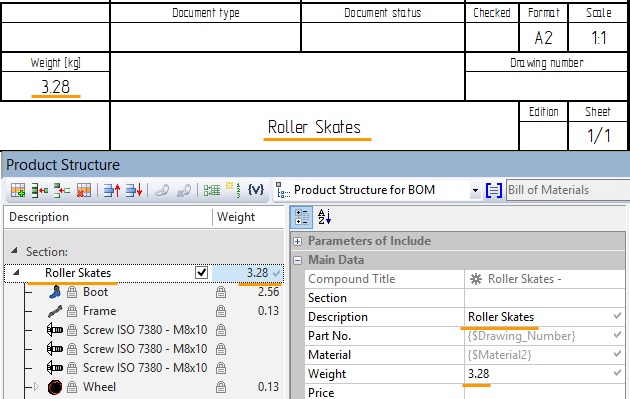
Product structure for assembly documents is automatically compiled on the base of product structure data of parts.
Data from various assembly sources can be added to the product structure. It can be fragments, bodies, 2D elements, etc. By default fields of the product structure records are set as automatically filled to use data from the source elements.
Icons indicate the field filling method. Automatic fields are indicated with ![]() icon. Manually assigned fields have
icon. Manually assigned fields have![]() icon. The third field type
icon. The third field type ![]() appears for specific fields that are also assigned automatically – titles, zones, page format, etc.
appears for specific fields that are also assigned automatically – titles, zones, page format, etc.
If you need to edit the content of a field manually, click appropriate icon. Thus «Field is filled by user» mode activates and icon will change to ![]() .
.
![]()
By default the new product structure has “General BOM” type.
Any product can be presented as the hierarchical structure (tree) in the Product structure window. The product itself is a root and its constituent components are presented as hierarchical records.
The product structure record is presented as a row in table with columns. It contains information about parts, quantities, materials, documents, etc. All data is inserted into data cells corresponding to the columns.
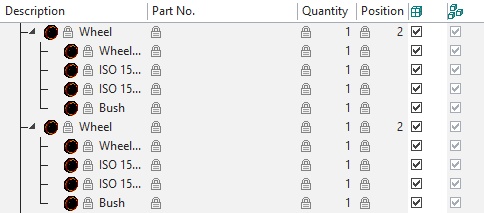
Product structure window has control toolbar that is located in the upper part of the window. It is used for various operations with the product structure.
![]()
Under the toolbar you may see the main product structure window that contains list of records, which are included into the current product structure. The following columns are displayed by default: “Description”, “Part No”, “Quantity”, “Position” and two columns for specifying inclusion of the records into reports and assemblies. If necessary, you can add/remove columns to be displayed in window manually.

Every product structure may have various “representations”. Representations allow to display the same product structure data according to the preset rules. For example, similar parts of assembly can be merged and their quantity can be displayed in the corresponding column. Or some data may be filtered out. To use representations press ![]() Apply product structure representation button on the toolbar. Necessary representation can be then selected from the drop-down list.
Apply product structure representation button on the toolbar. Necessary representation can be then selected from the drop-down list.

Each representation has its own properties set: displayed columns, sorting and grouping rules, filters, etc.
More information about representations can be found in “Representations tab” section.
|
|
Without representation |
With representation “With Records Merge” |
On the right side of the Product structure window you may open Parameters window via toolbar option ![]() Show record parameters window. All product structure columns and their content for the selected record are displayed here. Here you have access to all fields of the product structure record even those that are not displayed in the main window.
Show record parameters window. All product structure columns and their content for the selected record are displayed here. Here you have access to all fields of the product structure record even those that are not displayed in the main window.
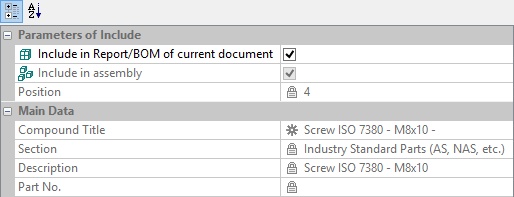
Toolbar
Product structure window toolbar provides options for:
●creating and deleting the product structures;
●editing the product structure properties;
●data adding, grouping and sorting;
●setting relations between product structure records and objects in the current document;
●reports generation and updating;
●callouts creation;
●export to Excel.
![]()
Product structure name is displayed in the field:

Every new document already contains the product structure called “General BOM” created on the base of “General BOM” product structure type. If you want to create another product structure you need to select “New product structure” item. After that in New product structure dialog box you can specify Product structure name and other parameters of the product structure. |
|
Product structure type. The drop-down list contains all available product structure types. |
|
Copy document template records when creating a new product structure. Product structure records will be copied from the selected template to the new product structure. User can select any document as a prototype if he select User-defined item in the drop-down list.
Product structure type is a set of properties for product structures used as a template for new product structure creation. Properties include columns composition, grouping rules, sorting and records filtering. Each product structure type is stored in the separate file.
New product structure types can be created with BY: Product structure types command.
You can set the following parameters in New Product Structure dialog box:
Export product structure to T-FLEX DOCs. If the flag is set, the current product structure will be saved when the file is exported to T-FLEX DOCs application. If there are several product structures, but no one was set for export, then the first one structure from the list is exported.
Getting location zones from fragments. If the flag is set, zones values are defined by the fragment location. If the flag is not set, the zone is defined by the callout location.
Zones are used for simplifying search of parts in big assemblies. You need to open Paper > Zones tab in the ST: Set Document Parameters command. Set the corresponding flags.

Exclude hidden objects. When the flag is set, only visible objects will be included in the product structure. Object no visible on the drawing/model, for example, hidden using levels mechanism or suppressed, will not be included.
Create hierarchy by tree of fragments. When the flag is set, the hierarchy, that exists in the fragment file, will be added to the assembly product structure. When the flag is not set, all items from the fragment file will be added to the same level in the assembly product structure.
When you create a new product structure based on the selected type, all properties will be copied and saved in the current file.
More information about the properties can be found in “Properties Tab” section.
![]() Add record option creates a new empty record (item) in the Product structure window.
Add record option creates a new empty record (item) in the Product structure window.

All new records are added to the zero hierarchical level. By default only records from first and upper levels are displayed in ![]() Apply product structure representation mode. That is why the new records will not be displayed in this mode.
Apply product structure representation mode. That is why the new records will not be displayed in this mode.
If there are several sections in the product structure, the new record will be created in the section that has input focus. Data is entered manually. Each data cell can be associated with a variable by setting the flag in the field.

To manage all existing data cells of the current record use ![]() Show record parameters window option.
Show record parameters window option.
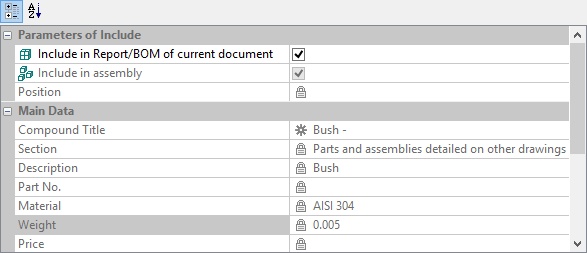
List of columns (cells) can be sorted using ![]() Categorized and
Categorized and ![]() Alphabetical options in the top of the window.
Alphabetical options in the top of the window.
![]() Add child record. Option is used to form the hierarchical structure of a product. It creates an embedded record relative to the current. The new record is indicated with
Add child record. Option is used to form the hierarchical structure of a product. It creates an embedded record relative to the current. The new record is indicated with ![]() icon.
icon.
![]()
![]() Add record to section option is used to add a new record to the section.
Add record to section option is used to add a new record to the section.
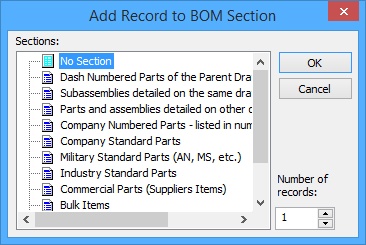
If there are any records existing in the required section, you can point the cursor on one of them and add a new record with ![]() option.
option.
Also you can specify the record section in the parameters window ![]() , by pressing on the corresponding field in the drop-down list.
, by pressing on the corresponding field in the drop-down list.
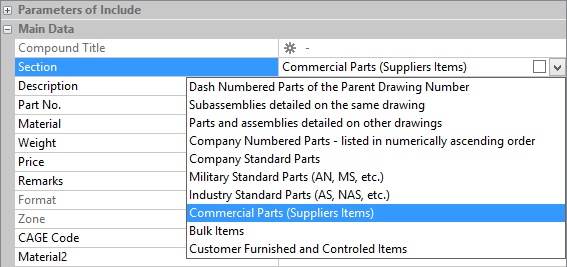
![]() Delete record option deletes the current record from the product structure.
Delete record option deletes the current record from the product structure.
![]()
![]() Move records up/down. This options allow to move selected records in the product structure. Moving is allowed only inside one section and with inactive sorting.
Move records up/down. This options allow to move selected records in the product structure. Moving is allowed only inside one section and with inactive sorting.
![]() Link selected objects with product structure record option allows to set links between product structure records and document objects (3D operations, 3D construction elements, 2D drawing elements).
Link selected objects with product structure record option allows to set links between product structure records and document objects (3D operations, 3D construction elements, 2D drawing elements).
The option is available only for manually created records. Such link cannot be set for records from fragments or any other data sources.
To set the link, perform the following actions:
1.Select record in the Product structure window. The string will be marked.
2.Select object in the scene with mouse click (it will be highlighted).
3.Press ![]() icon.
icon.
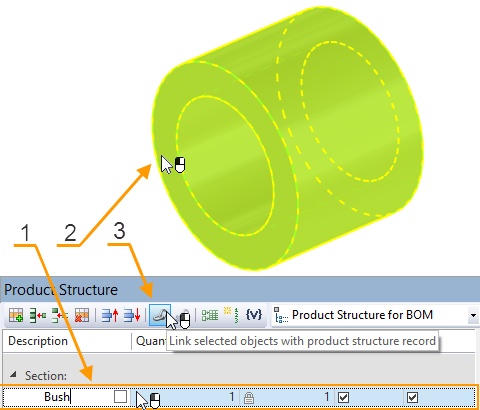
When the record is selected in the Product structure window, the linked objects are highlighted in the scene and in 3D Model window.
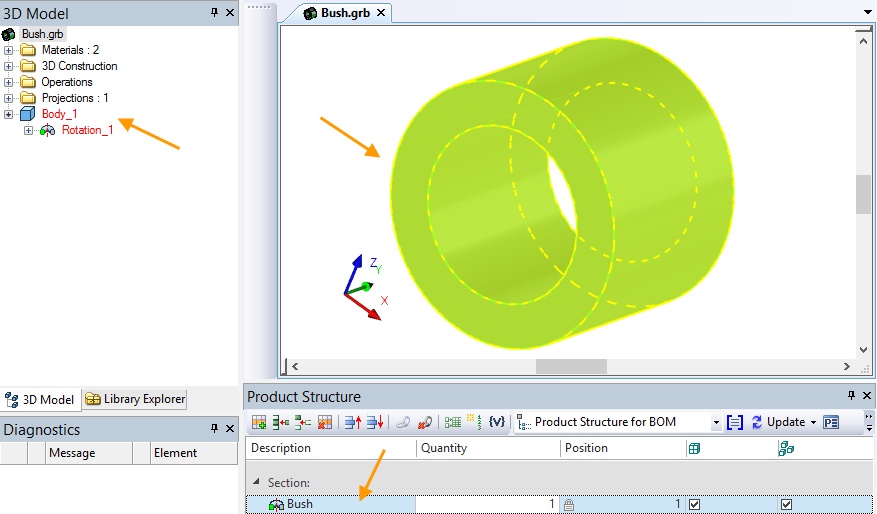
It is possible to link one record with several objects.
You can delete the link using ![]() Delete link of product structure record with objects option.
Delete link of product structure record with objects option.
Use BL: Create BOM Callout command to create callouts. For quick access to the command use icon ![]() .
.
More information about the command can be found in section “Callout Creation”.
![]() Show variable names. When option is active, the variables names are showed in cells that have link with those variables. When the option is inactive, the variables values are shown.
Show variable names. When option is active, the variables names are showed in cells that have link with those variables. When the option is inactive, the variables values are shown.

Use BI: Include in product structure command to manage parameters of the fragments inclusion into the product structure. You can use icon ![]() on the toolbar to activate the command.
on the toolbar to activate the command.
More information about fragments inclusion can be found in section “Include in product structure”.
![]() Apply product structure representation mode shows list of records according to the grouping and sorting rules set in the representation. When the mode is active, group names are displayed in the list and representations selection becomes available.
Apply product structure representation mode shows list of records according to the grouping and sorting rules set in the representation. When the mode is active, group names are displayed in the list and representations selection becomes available.
The ![]() mode allows to display data according to the preset rules of representations.
mode allows to display data according to the preset rules of representations.
Product structure without representation:
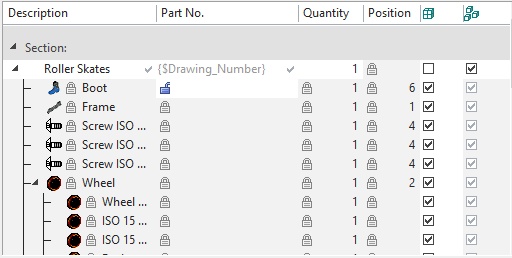
Product structure with representation that corresponds to standard BOM table. In this case, the group names are the names of the BOM sections:
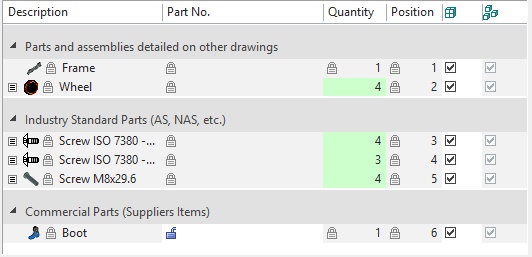
Fields are indicated with color if their values are summed.
Representation field. If there are several representations in the product structure properties, then you can select one of them in the Apply product structure representation field.

More information about representations creation can be found in section “Product structure types”.
|
Update. The command updates current product structure after changes in the assembly document or fragments. Update all. The command is updating all existing product structures. First, existing positions are updated, then – linked records. |
![]() Product structure properties option opens dialog of the current product structure properties. Modifications are saved in the current assembly file.
Product structure properties option opens dialog of the current product structure properties. Modifications are saved in the current assembly file.

You can change name of the current product structure in appropriate field. With a special flag you can mark product structure for be used when exporting assembly to T-FLEX DOCs.
Button Save properties as type will save the current product structure properties as a product structure type in *.xml format.
When a new product structure is created, it uses one of the product structure types that defines its properties and behavior. The original product structure type may change later due to various system improvements or customization. If this file with product structure type changes, system reflects this case with a warning message “Properties of product structure differ from properties of type used for its creation. You may update properties from the modified type or ignore this warning”.
You may either ignore this message and leave the original behavior of the product structure or update product structure properties from the modified type using Update properties button.
If necessary, you may also reassign product structure properties by reading them from any arbitrary product structure type by using Read properties from type button.
The information about product structure properties can be found in “Product structure types” section.
Use option
You can specify exporting of only columns visible in the product structure window by setting appropriate flag in the dialog that appears. If the flag is inactive, all product structure columns will be exported. Export hierarchy allows to export hierarchy of product structure record into Excel. You can set decimal separator for the exported values. |
|
If export is used in ![]() Apply product structure representation mode, the Show titles of sections flag will appear. These titles will be added to the additional column of the resulting excel table.
Apply product structure representation mode, the Show titles of sections flag will appear. These titles will be added to the additional column of the resulting excel table.
After that you can specify file name, folder and necessary Excel format - .XLSX or .XLS.
From a product structure you may generate various reports, like for example BOM tables on the drawing page.
To show all reports and BOMs created in the current document use BM: Report/Bills of material command. Icon ![]() is used to obtain quick access to the command.
is used to obtain quick access to the command.
![]() Delete product structure. The option allows to delete the current product structure.
Delete product structure. The option allows to delete the current product structure.
The search bar is located in the right part of the toolbar. It simplifies data search inside the product structure.

Input search string or a substring in the field or select from one of the previously used search strings.
The corresponding record will be selected after pressing <Enter> or ![]() button. Repeated pressing on <Enter> or
button. Repeated pressing on <Enter> or ![]() button gives next search result.
button gives next search result.
The data will be searched in both visible and invisible columns. When found, the corresponding record will be marked.
Reports
|
To create a report use option Preview is located to the left from the list. It can be hidden using button |
Properties of the product structure reports are displayed in the lower part of the window. You can change them for each created report if necessary. Lists of reports and their properties are stored in the product structure properties.

Report creation:
1.Select template for the report with preset rules for filling its fields;
2.Set properties of the selected template (optional);
3.Press [Run] button.
Use option ![]() Update product structure reports, located on the toolbar, to update the already existing reports.
Update product structure reports, located on the toolbar, to update the already existing reports.
More information about report creation can be found in “Create Report/BOM” section.
More information about report generator properties can be found in “Reports Tab” section.
Commands of the Product Structure Window Header Context Menu
You can find some commands for managing product structure in context menu of header. The context menu is called by right mouse click in the title of the product structure table. It includes the following commands:
Columns. The drop-down list of this command allows you to select columns to be displayed in the Product structure window.
A column is displayed in Product structure window when the flag is set near the column’s name.

Show all. When option is active all columns existing in the product structure will be shown.
Show Only Predefined. When option is active only columns with the preset flag Show column in Product Structure window will be shown. The option can be set on Columns tab in Product structure properties window.
Show Linked object. The option adds “Linked object” column to the table. The column shows names and icons of the data sources (for example, data of fragments).
Main Data. Includes main and manually created columns.
You can create a new category for columns. All manually created columns can be added to any category, except “Parameters of include”.
More information about columns can be found in the “Columns tab” section
Inclusion Data. Presents the following columns: Position, Include in report/BOM of current document, include in assembly.
Include in report/BOM of current document and Include in assembly columns displays flags that allow to include records into the current document reports and product structure of the upper level assembly.
Sort by. The drop-down list contains the most commonly used columns for sorting records.

Sort Ascending, Sort Descending. Sets sorting order for the current column of the product structure.
Cancel Sorting. Cancels sorting rules.
Show Grouping Tool Window. Activates special tool area in the upper part of the window to simplify grouping. To set grouping by column you need to drag its header to this area.

Group by This Column. When this mode is enabled, all records in the product structure will be
organized as groups with the same value in the current column. Sequence of grouping is displayed in the upper part of the window. Marker near the header allows to change sorting sequence.
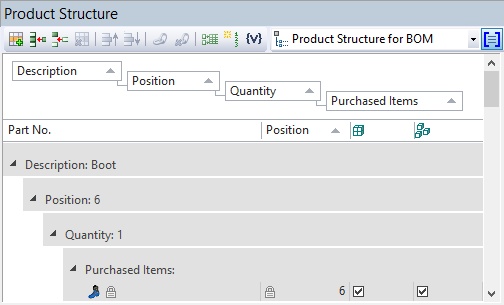
Group by Representation Rules. The grouping mode is set from the product structure properties. Each representation can have its own grouping rules set. Data is not grouped, when the flag is disabled.
The option is available only in ![]() Apply product structure representation mode.
Apply product structure representation mode.
Cancel Grouping cancels usage of all groupings rules set in the context menu or in the representation.
Borders. Allows to manage display of table borders in the Product structure window.

Alignment specifies text or icons alignment in the fields of the product structure for the column.

Hide Column. The selected column will be hided in the main window of the product structure.
Adjust Width. The option is adjusting width of columns to show their full names in the Product structure window. In case of insufficient space the priority goes to the column which header was used for command activation.
The Product structure item provides quick access to several commands that also exist in the toolbar.

Summation results command allows to assign sums of values in columns to variables. Summation of values is specified on the Sum tab in the product structure properties.
More information about the summation can be found in section “Sum tab”.
Context Menu of Product Structure Records
Context menu of a product structure record includes options for the product structure and the record itself.
|
You can create a child record for the selected record using option Add child record. To restore the original position of a record in the Product structure window, you need to select item Restore location of record in product structure. Option Expand All/Collapse All allows to show/hide grouped records. Create BOM Callout. Activates command for creating callout in the current document. After callout creation, you can select another record and continue working with the command. |
Restore location of record in product structure. You can restore locations of child records.
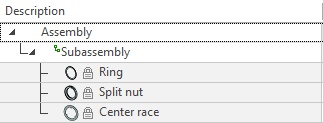
You need to select Restore location of record in product structure option to restore the source position of a record. The record appears on the source position after the product structure update.
|
|
|
Copy/paste options:
●You can copy the selected records using the clipboard;
●All records pasted from the clipboard will be added as “created manually”;
●If there were hierarchical relations between records before copying, they are retained after pasting.
●Links between records and variables persist while copying within one document. When you paste records into another document or text, only values will be copied;
●Hotkeys <Ctrl+C>/<Ctrl+V> are available for coping;
●When you paste records in the 2D window, they are inserted as text. Only columns visible in Product structure window are copied as text.
Product structure item in the context menu is similar to the same item from the headers context menu.
3D Fragment item appears in the context menu of each fragment. Its drop-down list contains all standard options for working with a fragment.
Reports item allows you to select report template from the drop-down list. The report will be generated after selection. Its properties are preset in the product structure properties.